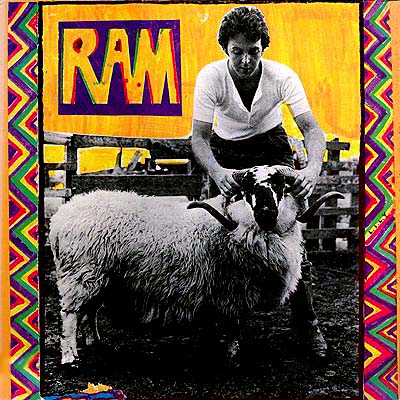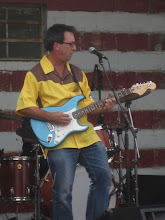Ram
With Paul McCartney's new album, Memory Almost Full, due out the first Tuesday of June, this month seems as good a time as any to review Macca's solo career. I am a fan, not a fanatic; I'm in awe of the guy's talent, though, and find a lot of creative inspiration in his work. I don't own all of his solo albums but I own a lot of them. I'll be writing about them, in the order they were released, over the next few weeks.

Ram commences with an adamantly down-strummed acoustic guitar and an indecipherable guttural shout (it could be "Piss off, yeah" or "Piece of cake" or "It's OK" or even "Feel so good" or just about anything else). As is so often the case on this album, exactly what McCartney is singing is almost beside the point. He's a bit miffed about something, apparently, but it's the sound, not the lyric, that really conveys the meaning. On this opening track ("Too Many People") and throughout Ram, McCartney demonstrates that his poetry is mostly in his music, not in his lyrics. Glorious melodies, gorgeous harmonies, exquisite arrangements and a wonderful palette of bass, drum, guitar, and keyboard sounds are what make Ram a masterpiece. The lyrics--though some are quite good (and some are just as awful)--are a nice addition but are rarely essential.
On some songs, the lyrics appear to be little more than placeholders, something for McCartney to sing so that the album's lyrical content doesn't consist entirely of "tra la la." Take "Monkberry Moon Delight," which begins
Some might cite this these as examples of McCartney's lack of substance, of a proclivity for polishing turds. I disagree. Some people express their profound thoughts in lyrics; others express those thoughts musically. And most of us poor saps are incapable of either. I'll take my genius in whatever form it takes, and if I have to choose one or the other, I'll take music over lyrics. A great song with an innocuous lyric is still a great song, while a great lyric with a terrible melody is a song you will forget.
And Ram is, in fact, more substantial lyrically than many of McCartney's post-Beatles efforts. The album focuses on several themes--the redemptive power of love, the joys of domestic life, the resuscitative powers of solitude and pastoral living--that collectively communicate McCartney's desire to redefine himself, to find meaning and fulfillment in something other than ex-Beatledom and pop stardom. This thematic focus results in the only dud on the record ("Long Haired Lady," which sounds like something from a very bad rock musical), but overall it provides the album with a coherence missing from many subsequent efforts. (Likewise, the relatively spare and organic sounds and arrangements chosen here work well not only on their own but also as a reinforcement of the album's "small is better" motif.)
But Ram's greatest pleasures come from the music, which reaches its pinnacle in the sublime pop songs "Dear Boy," the overplayed but endearingly loopy "Uncle Albert/Admiral Halsey," and the closing track "The Back Seat of My Car," which ends the proceedings in much the same way they began: with a guttural scream of indeterminate meaning but communicating an indisputable joy in the creation of great music.

Ram commences with an adamantly down-strummed acoustic guitar and an indecipherable guttural shout (it could be "Piss off, yeah" or "Piece of cake" or "It's OK" or even "Feel so good" or just about anything else). As is so often the case on this album, exactly what McCartney is singing is almost beside the point. He's a bit miffed about something, apparently, but it's the sound, not the lyric, that really conveys the meaning. On this opening track ("Too Many People") and throughout Ram, McCartney demonstrates that his poetry is mostly in his music, not in his lyrics. Glorious melodies, gorgeous harmonies, exquisite arrangements and a wonderful palette of bass, drum, guitar, and keyboard sounds are what make Ram a masterpiece. The lyrics--though some are quite good (and some are just as awful)--are a nice addition but are rarely essential.
On some songs, the lyrics appear to be little more than placeholders, something for McCartney to sing so that the album's lyrical content doesn't consist entirely of "tra la la." Take "Monkberry Moon Delight," which begins
So I sat in the attic, a piano up my nose,It's nonsense, as is the rest of this 5-minute-plus long song. It doesn't matter; the song is a pure joy, a nifty and rocking piano stomp with more great musical ideas than you'll find on most entire albums. Check out the nifty little bouzouki part or the great arpeggiated guitar lines or the bass line and scat that McCartney sings during the long outro. Or simply check out how McCartney totally throws himself into the vocal performance on this exceedingly silly song. It's hardly the only slight composition on this album that McCartney elevates through brilliant invention and full-tilt performance. The change in feel at the end of "3 Legs," the bridge section of "Eat at Home," the elaborate background vocals on the ukelele-driven (!) title track, the Little Richard-esque vocal on "Smile Away"--all take what could easily be ordinary, dull songs and transform them into something delightful and wonderful.
And the wind played a dreadful cantata.
Sore was I from a crack of an enemy's hose
And the horrible sound of tomato.
Ketchup,
Soup and puree,
Don't get left behind
Some might cite this these as examples of McCartney's lack of substance, of a proclivity for polishing turds. I disagree. Some people express their profound thoughts in lyrics; others express those thoughts musically. And most of us poor saps are incapable of either. I'll take my genius in whatever form it takes, and if I have to choose one or the other, I'll take music over lyrics. A great song with an innocuous lyric is still a great song, while a great lyric with a terrible melody is a song you will forget.
And Ram is, in fact, more substantial lyrically than many of McCartney's post-Beatles efforts. The album focuses on several themes--the redemptive power of love, the joys of domestic life, the resuscitative powers of solitude and pastoral living--that collectively communicate McCartney's desire to redefine himself, to find meaning and fulfillment in something other than ex-Beatledom and pop stardom. This thematic focus results in the only dud on the record ("Long Haired Lady," which sounds like something from a very bad rock musical), but overall it provides the album with a coherence missing from many subsequent efforts. (Likewise, the relatively spare and organic sounds and arrangements chosen here work well not only on their own but also as a reinforcement of the album's "small is better" motif.)
But Ram's greatest pleasures come from the music, which reaches its pinnacle in the sublime pop songs "Dear Boy," the overplayed but endearingly loopy "Uncle Albert/Admiral Halsey," and the closing track "The Back Seat of My Car," which ends the proceedings in much the same way they began: with a guttural scream of indeterminate meaning but communicating an indisputable joy in the creation of great music.
Labels: McCartney catalogue review, music


0 Comments:
Post a Comment
Subscribe to Post Comments [Atom]
<< Home